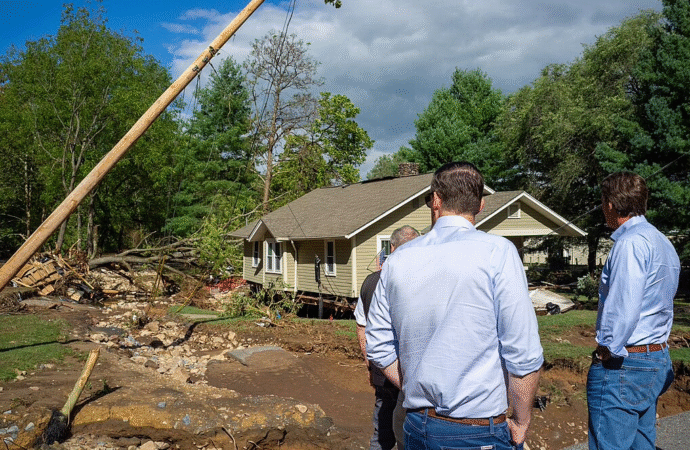A year ago, had you stood in front of Mountain Inn and Suites on the outskirts of Erwin, Tenn., to your left you would have seen four or five small businesses and some storage units, flanked by a Baptist church. To your right would be a Mexican restaurant, Panchos & Amigos, joined to a convenience store and gas station. Approximately 200 yards behind them you’d have seen the hospital, opened less than five years earlier.
Stand in that same spot today, and you’ll see that the small businesses have vanished.
On Sept. 27, 2024, Hurricane Helene smashed them up or swept them down swollen creeks and the Nolichucky River, which had flooded its banks. The church was heavily damaged, but is now finally holding worship services again. Mountain Inn & Suites was left with six inches of mud in its first floor, and the pump apparatus for the outdoor pool was destroyed. The mud was removed by hand, and the motel reopened at the beginning of the summer. The gas station is back in business, but Panchos & Amigos remains closed while undergoing repairs. The hospital was so severely damaged – some patients and staff had to be rescued from the rooftop – that it will never reopen.
In mid-August, when I stayed in Mountain Inn & Suites, the desk clerk, Rhonda Caldwell, showed me aerial photos revealing the raging flood waters. Like so many individuals, churches, and other organizations in the community, Caldwell stepped up and helped those who had lost so much. At one point, she was delivering some donated fast food meals to victims of the flood housed in the town’s other motel, a Super 8. A woman from Asheville, who had lost her car, her purse, her phone, and everything else, began weeping at this act of generosity. “Can I hug you?” she asked. “This is the first hot meal I’ve had in two days.”
Meanwhile, from all over the country, people contributed foodstuffs, clothing, bottled water, money, and more to the region. This outpouring of help was not only a material boost to residents of these mountains, but raised morale as well.
It’s always encouraging to read and hear of such acts of generosity – and there were many of them both in Erwin and in large parts of western North Carolina. Such stories remind us of the good in our country and its people, especially given the bleak take so often reported by our media.
But another part of this story should also inspire us: resilience.
The ability of the average human to make a comeback from disaster, on a grand-scale or in personal matters, can be stunning, as it was for me in Erwin. Here, 10 months after Helene, the grit and tenacity the hurricane fostered in Caldwell and others was still palpable. None of them will forget that day of destruction – everyone in the town dates events by Helene – but no one I met had simply thrown up their hands and surrendered. They tended the homeless, broke out the shovels and wheelbarrows, and set about repairing the damage to their businesses, pitching in to help one another.
Throughout my life, I’ve seen this species of strength at work. When my dad long ago divorced my mom, for example, leaving her with three children still at home, the shock of that abandonment initially hit her like a knock-out blow. But she eventually shook it off, setting out to make a life for herself and her children. No complaints, no whining, no raised fist to God or circumstance. If anything, her faith deepened.
And that’s just one example I can recount from life.
Literature and history provide countless similar examples of interior fortitude, or its absence, when faced with calamity. King Alfred the Great refused to give up his people to the Viking invaders; the stouthearted girl Mattie Ross in “True Grit” who relentlessly pursues his father’s murderer; Hemingway’s Santiago in “The Old Man and the Sea;” Corrie ten Boom’s faith in a Nazi prison – the stories would literally fill several large libraries.
Sooner or later, all human beings suffer some sort of calamity that knocks them flat, whether it be a flood, a death in the family, a failed business venture, or some other wound. Each time, we have to choose between staying down or getting back on our feet. The husband whose wife unexpectedly dies, leaving him not only demolished by grief but with the care of children, either pulls himself up and takes the reins of parenting and work, or he may go the way of self-pity, medicating his despair with drugs or alcohol.
In her 2008 Harvard Commencement speech, J.K. Rowling of Harry Potter fame concluded of her years of struggle and poverty, “[R]ock bottom became the solid foundation on which I rebuilt my life.”
That’s the iron code which defines resilience.
—
The republication of this article is made possible by The Fred & Rheta Skelton Center for Cultural Renewal.
Image Credit: Flickr-Official Photo by Christian Martinez, Office of Governor Glenn Youngkin, CC BY 2.0
42 comments















42 Comments
Work AT Home
September 18, 2025, 5:46 pmMy last month paycheck was for 11000 dollars… All i did was simple online work from comfort at home for 3-4 hours/day that I got from this agency I discovered over the internet and they paid me for it 95 bucks every hour…. for more info visit any tab this site Thanks a lot .
🙂 AND GOOD LUCK.:)
HERE====)> https://www.Paycash1.site
REPLYMaria@Work AT Home
September 18, 2025, 5:46 pmMany people of USA and other world have lost their regular jobs. This washorrible and i know what is the feeling when you didnot have any money left foryour family. But i am here to share an easy solution which solves all financialproblems right now. Working from home job which can gave you more than $15kevery month just by staying at home. So follow this web now for more info andstart earning right now..
REPLYCLICK THIS LINK___ https://www.Homeprofit1.site
Annelie Remington@Maria
September 19, 2025, 2:26 pmStart making cash right now… ʜᴏᴍᴇ ᴄᴀꜱʜ ᴇᴀʀɴɪɴɢ ᴊᴏʙ ᴛᴏ ᴇᴀʀɴꜱ ᴍᴏʀᴇ ᴛʜᴀɴ $500 ᴘᴇʀ ᴅᴀʏ!** ɢᴇᴛᴛɪɴɢ ᴘᴀɪᴅ ᴡᴇᴇᴋʟʏ ᴍᴏʀᴇ ᴛʜᴀɴ $4.5ᴋ ᴏʀ ᴍᴏʀᴇ ꜱɪᴍᴘʟʏ ᴅᴏɪɴɢ ᴇᴀꜱʏ ᴡᴏʀᴋ ᴏɴʟɪɴᴇ. ɴᴏ ꜱᴘᴇᴄɪᴀʟ ꜱᴋɪʟʟꜱ ʀᴇQᴜɪʀᴇᴅ ꜰᴏʀ ᴛʜɪꜱ ᴊᴏʙ ᴀɴᴅ ʀᴇɢᴜʟᴀʀ ᴇᴀʀɴɪɴɢ ꜰʀᴏᴍ ᴛʜɪꜱ ᴀʀᴇ ᴊᴜꜱᴛ ᴀᴡᴇꜱᴏᴍᴇ. **ᴡᴀɴᴛ ᴛʜᴇ ꜱᴇᴄʀᴇᴛ?** ᴄᴏᴘʏ ᴛʜɪꜱ ᴡᴇʙꜱɪᴛᴇ ᴀɴᴅ ᴄʜᴏᴏꜱᴇ ʜᴏᴍᴇ ᴛᴇᴄʜ ᴏʀ ᴍᴇᴅɪᴀ…
ᴛʜɪꜱ→→→→ https://Www.EarnApp1.Com
REPLYEmmaline Aue@Annelie Remington
September 19, 2025, 2:27 pmI get paid over $220 per hour working from home with 2 kids at home. i never thought i’d be able to do it but my best friend earns over 15k a month doing this and she convinced me to try. the potential with this is endless…,
Here is I Started ➤➤ https://Www.HighProfit1.Com
REPLYMauricioSAlcantara@Maria
September 23, 2025, 5:20 amI get paid more than $120 to $130 per hour for working online. I heard about this job 3 months ago and after joining this i have earned easily $15k from this without having online working skills. This is what I do……………..Www.Works6.Com
REPLYBobbi W. Fregoso@Work AT Home
September 18, 2025, 5:48 pmI make up to $24 an hour working from my home. My story is that I quit working at Walmart to work online and with a little effort I easily bring in around $45h to $89h… Someone was good to me by sharing this link with me, so now I am hoping I could help someone else out there by sharing this link.Try it, you won't regret it!.
HERE→ https://Www.Worksprofit1.online
REPLYRaquel Shaw@Work AT Home
September 19, 2025, 2:48 pmI work from home and earn a respectable $6k a week, which is amazing considering that a year ago I was unemployed in a terrible economy. I always give God praise for honoring me with these rules, and now it’s my duty to practice anticipatory compassion and share it with everyone. Likewise,
Here is I begun—> http://Www.Cashprofit7.site
REPLYJimbeau@Raquel Shaw
September 20, 2025, 11:23 amI get paid over 220 Dollars per hour working from home with 2 kids at home. i never thought i’d be able to do it but my best friend earns over 15k a month doing this and she convinced me to try. it was all true and has totally changed my life. This is what I do, check it out by Visiting Following Website…
REPLY.
.
HERE—————⊃⫸ https://Www.Cash43.Com
RSLewis@Jimbeau
September 20, 2025, 11:24 amGoogle is now paying $300 to $500 per hour for doing work online work from home. Last paycheck of me said that $20537 from this easy and simple job. Its amazing and earns are awesome. No boss, full time freedom and earnings are in front of you. This job is just awesome. Every person can makes income online with google easily….
REPLY.
More Details For Us→→ http://Www.Payathome9.Com
Vanessa D. Guerrero
September 18, 2025, 5:52 pmI am making over $30k a month working part time. I am a full time college student and just working for 3 to 4 hrs a day. Everybody must try this home online job now by just use this Following Website…….. https://Www.Join.Homeprofit1.site
REPLYVanessa D. Guerrero
September 18, 2025, 5:53 pmI am making over $30k a month working part time. I am a full time college student and just working for 3 to 4 hrs a day. Everybody must try this home online job now by just use this Following Website…….. https://Www.Join.Homeprofit1.site
REPLYVanessa D. Guerrero
September 18, 2025, 5:53 pmI am making over $30k a month working part time. I am a full time college student and just working for 3 to 4 hrs a day. Everybody must try this home online job now by just use this Following Website…….. https://Www.Join.Homeprofit1.site
REPLYMary Robinson
September 18, 2025, 5:55 pmGood day to everyone reading my post, i'm here to appreciate a legitimate spell caster call Dr Kachi who can help you winning the lottery draw, i have never win a biggest amount in lottery unite the day i saw good reviews about DR Kachi how he has helped a lot of people in different ways both financially/martially and i have been playing Mega Million for 8years now, but things suddenly change the moment i contacted Dr Kachi and explained everything to me about the spell and I accepted. I followed his instructions and played the Mega Million with the numbers he gave me, now i am a proud lottery winner with the help of Dr Kachi spell, i win $640 Million Dollars in Mega Millions Ticket, i am making this known to everyone out there who have been trying all day to win the lottery jackpot, believe me this is the only way to win the lottery, this is the real secret we all have been searching for. I want to thank Dr Kachi for his endless help and his from the United States. you can contact via email [email protected] or through Text and Call Number: +1 (209) 893-8075 his website: https://drkachispellcaster.wixsite.com/my-site
REPLY